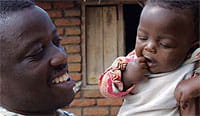The condition of a person’s teeth and gums can affect their whole health. Strong teeth are needed to eat food like nuts, maize, fruits and meat, which are important for good health. Mouth pain can make eating difficult and lead to malnutrition. Oral health problems such as tooth decay and gum disease are caused by not cleaning teeth properly.
Here are some guidelines for maintaining healthy teeth and gums:
- Brush your teeth and clean your gums regularly, preferably twice a day.
- After eating, cleanse your mouth thoroughly, so that no bits of food are left on your teeth. Try to avoid eating snacks between meals.
- Rinse your mouth every day with warm salt water to keep your gums healthy.
- Where possible, visit a dentist for a check up regularly.
Diet and dental health
Instead of growing and preparing their own food, many people are now eating more processed foods bought from shops, such as bread, sweets, chocolate and biscuits. It is especially important for children, older people and pregnant women to eat the right foods. Try to eat a lot of fresh fruits and leafy green vegetables. Vegetables have fibre in them and this prevents food from sticking in the mouth. Fresh fruits contain vitamins and minerals that help ensure healthy gums. If it is difficult for you to bite into fruit, squeeze it and drink the juice.
Soft and sweet food, and drinks with a lot of sugar are bad for both teeth and gums. Sweet food can mix with germs and make cavities – holes in the teeth. Soft food sticks to teeth more easily and can mix with germs to cause gum disease if you do not clean your teeth.
- If there is a painful cavity, crush some cloves and place them, or oil of cloves, in the cavity. This will help to ease the pain. Seek dental treatment as quickly as possible.
- If there is bleeding from the gums, rinse with salt water or dissolve a spoonful of salt in a few drops of water and massage the gums with this solution.
Sensitive teeth
Sometimes people experience sharp pain in their teeth when they eat hot, cold, sweet, or sour foods and drinks. If you often eat foods such as lemons and other citrus fruits, then the acid that these contain can damage the enamel coating of your teeth. To help with this sensitivity, it is important to maintain good oral hygiene, and continue to clean all parts of your teeth and mouth thoroughly.
Babies’ teeth
Tooth decay is a common problem even in babies and young children. Their teeth become painful and appear brown or dark in colour. It can cause infection of the gums and an early loss of teeth. This condition is often found in babies who are bottle-fed. Babies tend to drink slowly from bottles and the constant dripping effects of the sugar in the milk onto the front teeth causes rapid decay.
To avoid this:
- Breastfeed rather than bottle-feed.
- Do not give a baby anything to drink from a bottle. Sweet tea, sugar water or fruit juice can easily damage the child’s teeth.
- A baby’s teeth and gums should be cleaned after every feed or meal, beginning as soon as the first teeth appear.
- Babies should be encouraged to use a cup as soon as they can, as they are less likely to drink continuously from a cup.
Dr Mathew George is Coordinator of Oral Health Services for the Emmanuel Hospital Association.
The Duncan Hospital
Raxaul
Bihar 845305
India
Email: [email protected]
Website: www.eha-health.org
Case study
Ms Sudesh Kumari is a community dental nurse working in the remote Rajmahal hills in Sahibganj District of Jarkhand State of India. She works in seven villages, providing dental health education as well as dental treatment. She works with the women’s groups, youth clubs and primary schools in the villages, teaching them about oral hygiene. By working with women and children she has encouraged whole families to follow her dental hygiene guidelines. Since they are too poor to buy either toothbrushes or toothpaste, she encourages them to use supple twigs from local neem trees instead. These twigs are freely available, cheap and effective, and studies show that the sap of a neem twig may have beneficial properties.
Cleaning teeth
If you do not clean your teeth properly, the food that is left on your teeth can damage the teeth and gums. It is important to clean your teeth carefully every day. Use a soft toothbrush. A soft brush will not damage your gums. If you do not have a toothbrush you can make a brush yourself:
- Select a soft, green twig (preferably from a neem or jujube tree) or piece of young bamboo or strong grass.
- Chew or pound one end to make it stringy like a brush.
- Sharpen the other end so that you can use it to clean in between the teeth.
Whatever kind of brush you use, clean your back teeth as well as your front teeth. Scrub all sides of each tooth, paying attention to the tops and sides where the grooves are. Use a circular cleaning motion while moving horizontally along the gum. Do not brush too hard. Then push the hairs of the brush between the teeth and scrub.
If you do not have toothpaste you can use salt dissolved in clean water. Baking soda can also be used as a substitute for toothpaste by mixing 1 teaspoon of soda in 3 teaspoons of water and dipping the brush into it. When your teeth are clean, rinse away the loose pieces of food with clean water.










